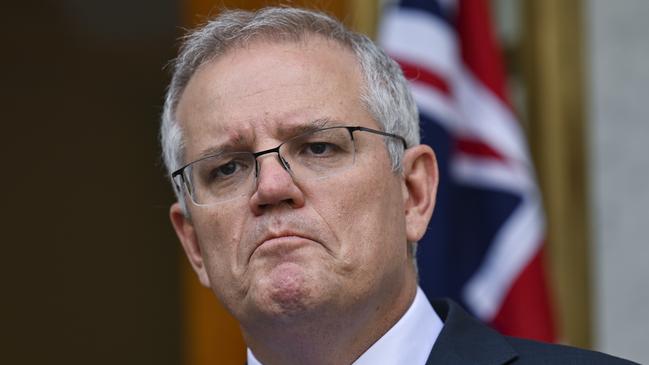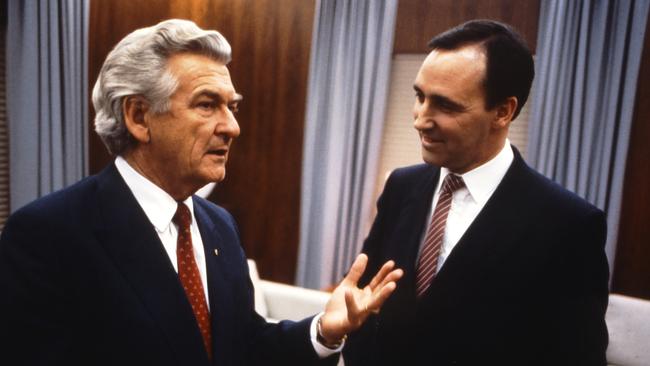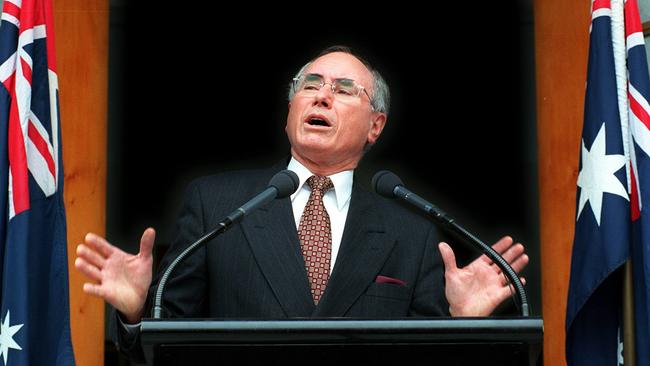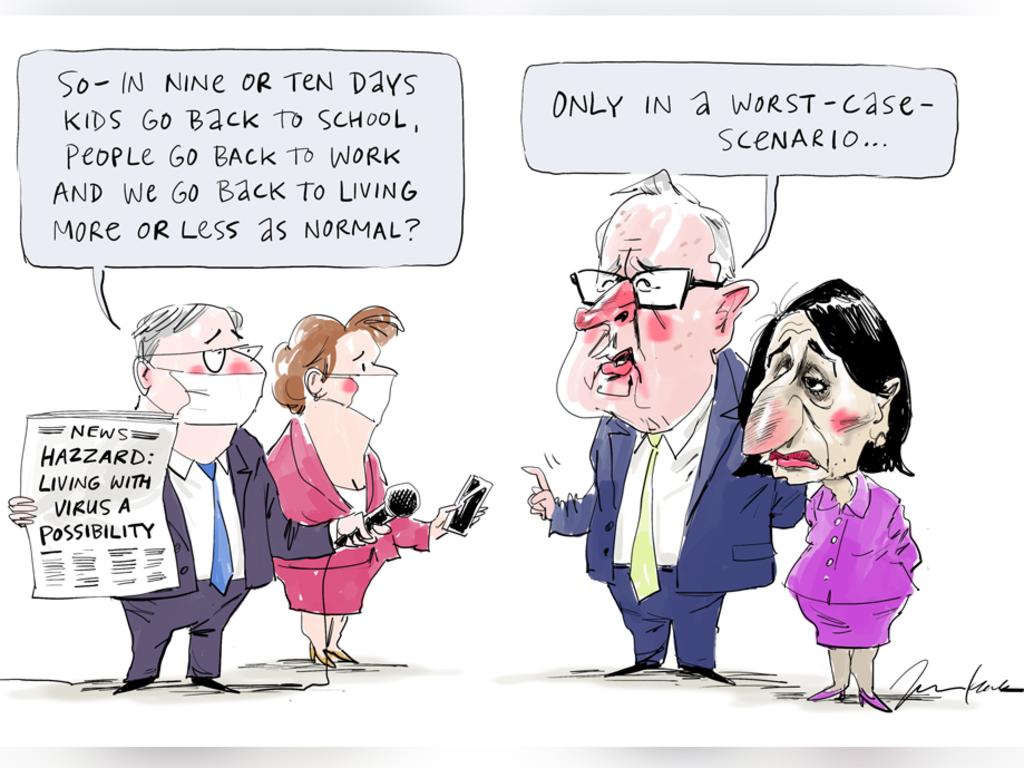
If the Hawke government could float the dollar, cut tariffs, deregulate the finance sector and begin privatisation; and if the Howard government could reform the waterfront and the construction sector, bring in the GST and Work for the Dole, plus privatisations and more; why have subsequent governments found reform so hard?
It’s not like change for the better is no longer needed. Last week’s Intergenerational Report forecast budget deficits stretching for the next 40 years, even with the unrealistic assumption that productivity growth would be vastly higher than anything actually achieved over the past decade.
So if economic reform is more necessary than ever, why is it off the agenda of both the main political parties?

Sure, Labor will say “reform” is getting to net-zero emissions by 2050 and perhaps point to the NDIS (but it is worth noting that the NDIS had bipartisan support). And the Liberals will talk about instant asset write-offs to boost investment and the recent “stapling” of individuals’ super accounts to avoid duplicate fees.
But, while the NDIS is meant to improve people’s quality of life, it won’t make much difference to our economic performance. And even if cutting emissions really is necessary to save the planet (which is far from certain), there will be massive transitional costs as we move to a zero-fossil-fuel, transport-constrained and largely meat-less future.
And while to be fair, there have been solid incremental reforms from Josh Frydenberg, more will be needed (including some politically difficult ones) before he can match Peter Costello or even Paul Keating, and address the longer-term economic challenges.
Prior to 2013, I used to think that the longer the Rudd-Gillard government lasted, the better the Howard government looked. But neither has the current government done much to knock the Howard government off its pedestal. What has happened to turn Australia’s politicians from leaders of policy debate to followers?
The revolving-door prime ministership certainly hasn’t helped. New PMs mean big reshuffles. All new ministers need time to get on top of their portfolios. Compared to the Howard government – which had the same PM, the same treasurer and the same foreign minister for almost 12 years – the current government has had only one minister in the same job for seven years, Mathias Cormann, and he has now gone.
Ministerial turnover inevitably means comparatively greater authority for a public service that’s become better at analysing problems than solving them. Look at the way all levels of government and both sides of politics now defer to unelected and unaccountable officials in what strikes me as an abrogation of their duty to the voter.
One of the real problems over the past couple of decades has been the decline of Treasury, which used to be the intellectual powerhouse of the Australian public service but which is now fixated on high immigration as the one fail-safe route to economic growth. While pre-pandemic Australia had had only three quarters of negative growth since the 1991 recession, there had been 20 quarters of falling GDP per capita, because population increases via immigration have just papered over the cracks.

It explains the political reality of why people have felt poorer even while the country apparently grew richer. The past decade’s record high immigration has coincided with record low productivity growth; yet Treasury tells any government that wants to cut or to refocus the program that it has to “fund” any change. Is it any wonder that distracted politicians give up?
Business groups are now too timid or too woke to drive public debate. Look at the latest missive from the BCA last week, demanding reform while lamely putting forward topics for discussion rather than specific proposals.
Then there’s the apparatchik culture that’s becoming stronger, with leadership teams on both sides of politics largely comprising former party officials, political staffers and union reps – essentially lifelong political bubble dwellers, more driven by polling and focus groups than conviction.
Most of all, the Liberals are still scarred by the fate of the 2014 federal budget, the last attempt at serious economic reform, which Clive Palmer sabotaged in the Senate as part of a behind-the-scenes power play.
Much of what was identified as a fiscal risk back then in Tony Shepherd’s Commission of Audit, and blocked by the Senate, has only got worse and more urgent, as the Intergenerational Report, eight years on, has shown.
This term, the government has dropped even minor workplace reform and cuts to the super levy – let alone more far-reaching reform of the tax system or the federation – on the grounds they wouldn’t pass the Senate. And it has left introducing religious freedom protection too late to be voted upon this term.
Scott Morrison seems to have decided if it’s not going to pass, it’s not worth pursuing – even though nothing that matters is ever going to be decided without a fight and what’s the point of re-electing a government if it only stands for whatever the ALP or the Senate crossbench will support?
Elections are contests, not coronations. To win a fourth term, there will have to be at least a few big points of difference between Liberal and Labor. Backing nuclear power, for instance, would enable the Prime Minister to reassure some voters that he’s serious about cutting emissions and others that he’s serious about base-load electricity. It could be his best way of uniting the right and dividing the left. Yet he says that a consensus is needed before he would even try to lift the legislative ban, even though Labor would only ever give this consideration after it has lost an election on the issue.
It took two election defeats for Labor to support the GST. It took an election defeat and the palpable success of the government’s policy for Labor to support border protection. Leadership is not finding a consensus, it’s building one. And the best way to do that is to fight an election on the things you believe in. Perhaps the main difference with the Hawke/Howard era is that we then had more substantial people in our public life.
As the next election looms, for our country’s sake, I hope our leaders will prove me wrong.
Peta Credlin is the host of Credlin on Sky News, 6pm weeknights.








Even though it seems like the pandemic will never end, eventually it will; and all the other challenges that we’ve neglected for the past 18 months will still be there. In fact, I suspect our current crop of leaders have quite enjoyed the pandemic because it has given them an excuse to put aside the issues that will make or break us as a nation, as well as a justification for neglecting the reform that Australia needs.